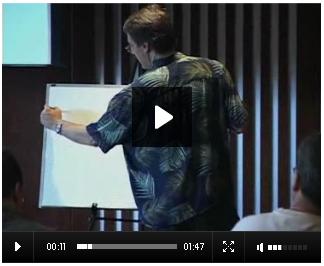Mel,
Listen up:
Somebody's going to make a lot of money from what I'm about to say here—might as well be you.
The pricing of services, especially in niches, is EXTREMELY elastic.
This has a lot to do with the fact that people take services very seriously. ("Big-Ass Fans" is wildly successful, but "Big-Ass HVAC Contractors" would go belly up before they ever got a single customer.)
Service businesses are also more intrinsically personality driven than product business.
So the pricing strategy you use for services needs to be much, much different.
For example, if you sell a $20,000 car, then when you add the Mop&Glo and the extended warranty and the high-end stereo and the espresso machine, maybe the price goes up to $30,000.
Upsells on hard products are usually very incremental, and only a fraction of the base price.
Services, information and advice are different.
When you sell services and information, the variation in price should change by a factor of 10 or 100 or 1000, depending on how much of you the customer gets.
Let's say you sell a piece of software.
Your basic version costs $200. Then you have a $350 version and a $500 version.
That's how most software companies structure their pricing—and as a result they're waltzing right past stacks of $100 bills.
Here's how how I'd approach it...
I'd start with the same $200 version, and then have about five or six upgrades that are all 2-3X more expensive than the previous tier.
The product lineup would look something like this:
- Basic version with online support is $200
- Deluxe is $500 with online support
- Deluxe with weekly training teleconference calls is $1,000
- Deluxe, with weekly training teleconference calls and remote installation & service done by your staff via the Internet, $2,500
- Deluxe, with online installation & service, 8-5 live phone support, and the weekly training teleconference calls, $5,000
- Deluxe, with on-site installation & service, 24 hour live phone support including a special "911 hotline" for dire emergencies, plus the weekly teleconference calls, $10,000
- Presidential Platinum Deluxe, with on-site installation & service, redundant servers, 24 hour live phone support and 911 hotline, six weeks of intensive hands-on, on-site training and a direct line to the president of the company in case there are any problems, plus the weekly teleconference calls, $25,000.
Now if you build your sales process and story according to this "logarithmic" pricing model, where upsells are multiples instead of linear increments, here's what you'll discover:
1) You will make roughly equal amounts of revenue from every single price level. In other words, you sell about as much dollar volume of $10,000 packages as $200 packages. But you only have to deal with 1/50th the number of customers. Big money from small numbers.
2) You will extract maximum sales from your marketplace and take full advantage of the extreme pricing elasticity that exists in the market
3) You will almost invariably find that your high end customers are more pleasant and less troublesome than your low-end customers
4) You can fire or downgrade problem customers
5) It's easier for you to prioritize who gets the majority of your time and attention—you just see which kind of customer they are.
Useful bonus tip:
It's perfectly OK to have a super-duper deluxe version that hardly anyone actually buys.
Tom Orent, a business coach for cosmetic dentists, used to do this with his $72,000 coaching program. Nobody ever bought it, but it made his $48,000 program more palatable.
So think very carefully about how you can add a Presidential Super Platinum Deluxe version of what you sell.
It's a terrific cash-flow slack adjuster.
Carpe Diem,
Perry Marshall
***NOTE: This email address isn't monitored! If you need help, please email:
support@perrymarshall.com
 | Free Video
We manage our emails with Infusion. This Guide and Video explain my secret marketing sauce. |
No comments:
Post a Comment